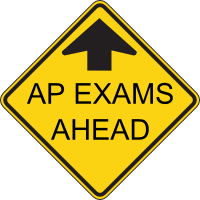 It’s that time of year again! The beginning of April marks the one-month countdown until AP exams begin. AP teachers are crossing days off their calendars, hoping that all the content has been absorbed, and thinking about how to most effectively review a year of information in the span of a few weeks. Advanced Placement classes are becoming more popular in schools, but with them comes two main challenges: teaching rich content that has extreme breadth, but often not a lot of depth; and the pressure of a high stakes exam at the conclusion of the course. The reward of Advanced Placement is college-level rigor in a high school classroom, and college credit if the student passes the exam (depending on the subject, the score requirements are different). Educators who have managed AP classrooms for years have developed systems and procedures to deal with the challenges, but this time of year still brings that Exam Time anxiety.
It’s that time of year again! The beginning of April marks the one-month countdown until AP exams begin. AP teachers are crossing days off their calendars, hoping that all the content has been absorbed, and thinking about how to most effectively review a year of information in the span of a few weeks. Advanced Placement classes are becoming more popular in schools, but with them comes two main challenges: teaching rich content that has extreme breadth, but often not a lot of depth; and the pressure of a high stakes exam at the conclusion of the course. The reward of Advanced Placement is college-level rigor in a high school classroom, and college credit if the student passes the exam (depending on the subject, the score requirements are different). Educators who have managed AP classrooms for years have developed systems and procedures to deal with the challenges, but this time of year still brings that Exam Time anxiety.
I love my AP classes – it is invigorating to teach students who chose to challenge themselves with a difficult level of academics. Some of them have to learn self-discipline and organization the hard way, but soon find those basic elements made learning so much more accessible. The stress of the exam is always on the minds of many of the students, and so I design my AP courses (US Government & Politics, US History) in a way that creates a growing sense of confidence and takes the mystery out of the exam itself. By the time April arrives, my students are ready to tackle the final challenge of the course.
Here are a few methods I’ve learned to create an AP classroom that tries to diminish the pressure of the exam, and imbue the curriculum with more depth:
- Backwards Plan. Before the year starts, mark the date of your AP exam on your calendar and then work backwards, always leaving at least 2 – 2 ½ weeks for solid review before the exam. Knowing your curriculum and knowing the exam is essential for this process. When you backwards plan, you can create an overall Essential Question for your course, and smaller questions for your units. Those Essential Questions will give the often very broad AP curriculum more depth for your students to digest. Essential questions work in any subject area.
- Ignore the Exam at First. For the first part of the course (usually AP classes are year-long, so for the first semester, this works), scaffold the necessary skills into the curriculum by independently including them in assignments, rather than putting test pressure on students from the beginning. Don’t talk too much about the test, reassure the students they WILL be ready, but don’t let it loom like an intimidating specter over class time. I do this by starting gently with necessary skills (technical writing, document-based arguments, etc.) as regular tasks so that by November, the students are completely used to doing writing, having it timed, and collaborating to make sure they understand the content as more and more adds on.
- Weave in Student Choice. In my state, there is usually about a month of school left after students take the AP Exam. Backwards plan for how you will use that time to end the course with the same level of rigor, but also as a reward for the students’ hard work all year. I do this by incorporating student choice throughout the year, building up to a final project. In the first semester, students choose topics they are interested in within the curriculum they are learning. I want my students prepared for college in more ways than having just taken a difficult course. So I use their choices of topics to teach the basic steps of research and crafting annotated bibliographies. We work up to how to do this over the course of six months so that by the time they have reached Test Prep time, they have already accomplished writing a full Annotated Bibliography and a detailed research process. The month after the exam is then time for them to have free reign on how to present their topics. They love letting loose and having fun after the exam is over, and I’ve gotten such creative projects during this time: original plays, poetry, paintings, original music compositions, invented board games, sculptures, collages, and speeches. It’s all based on topics they have owned throughout the year, so they end the course not with an ambiguous feeling about an exam for which they won’t even get their scores until July, but with a sense of triumph and having demonstrated a depth of knowledge on a topic that matters to them.
- Demystify Standardized Exams. I always start review time with several days of not even talking about our particular exam. Instead, I begin with engaging the students in the history of why there are standardized tests, and then allowing them the opportunity to not only see the inherent bias in standardized tests, but to have some power over them. We talk about how standardized exams began with the onset of Eugenics, and the “data society” that America became in the early 20th century. I then have them think about two or three things that they are experts in. It can be anything! Students are experts in all kinds of things that they don’t get to use or enjoy during school hours: TV shows, music, bands, Pokemon, video games, sports, languages, anything. Then they craft a three-question multiple-choice test with AP style response options (which they are well familiar with by this point!). The key to this exercise is that they write the questions at the level of their own expertise. But here’s the clincher: they then exchange tests and have to take the test on someone else’s expert topic. They get a very brief experience of taking an exam on something they know nothing about and how frustrating that is, especially after enjoying the heady feeling of writing an exam based on their own unique expertise. This tiny exercise serves to show them that the AP Exam will be nothing like this because they are all experts in the material! They have spent a year learning, working with, and practicing with all the information they need. They are ready – so our review time is only about moving everything from their long-term memory up into their short-term memory. And unlike this quiz written by a classmate, they can be confident they ARE experts for the AP exam.
Building student confidence and ownership over the span of an AP course can be one of the most crucial ways you prepare your students for the exam. Having something for them to look forward to after the exam also helps by removing the pressure of it from the end of their school year. Imbuing them with the value inherent in them as people, giving them choice and ownership over the content they’ve learned, and repeatedly assuring them of your own confidence in their expertise are all crucial parts of test prep. It’s that time of year, and in about a month, thousands of students across the country will be able to show their stuff – knowing that it doesn’t define who they are as people is one of the biggest gifts we teachers can give them.
What do you do to help your students prepare for the AP exams?





Leave a comment